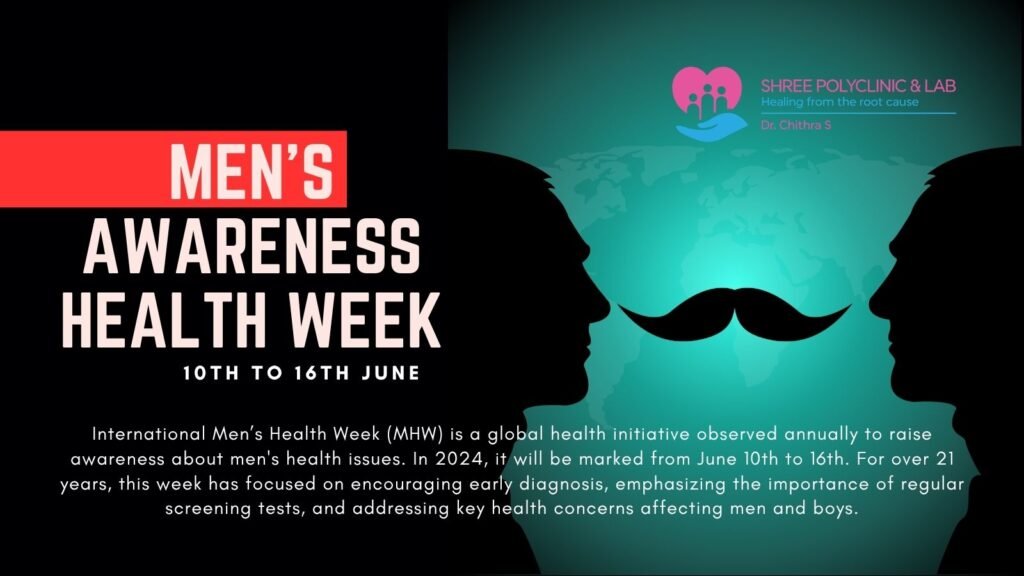International Men’s Health Week (MHW) is a global healthcare awareness initiative celebrated annually to spotlight the unique health challenges faced by men and boys. In 2025, the week will be observed from June 10th to 16th. For over 22 years, this event has focused on early diagnosis, preventive screenings, and encouraging open conversations around men’s physical and mental health.
Why Men’s Health Week Matters
Statistically, men’s health outcomes are often poorer than women’s. According to a World Health Organization (WHO) report, as of 2015, the average male life expectancy was 69.1 years, significantly lower than the female average of 73.8 years. No country reported male life expectancy higher than females.
The Office for National Statistics (ONS) also projected in 2015 that between 2014 and 2039, the population of men aged 65 and above would more than double, reaching 11.4 million (114 lakhs) for those over 65 and 5.2 million (52 lakhs) for those over 75. Many of these men will be vulnerable to chronic diseases in the years to come.
Men are also less likely than women to recognize early warning signs of serious illnesses such as cancer. In addition, older men are at a higher risk of experiencing social isolation, which significantly affects mental well-being and overall quality of life.
Despite growing awareness, men’s mental health is still not adequately acknowledged in many healthcare systems. Even in countries making strides, the interventions often remain small-scale. A sedentary lifestyle, risky habits (like smoking, alcohol, and unhealthy eating), and underuse of preventive health services are major contributors to poor health outcomes in men.
Theme for Men’s Health Week 2025
The theme for Men’s Health Week 2025 is:
“Men’s Health Checks: Early Action Saves Lives”
This year’s focus is on encouraging men and boys to undergo regular health check-ups, raising awareness about preventable illnesses, and promoting timely screenings to catch potential health issues early.
Previous Year Themes
- 2024 (June 10–16): Men’s Health Checks
- 2023 (June 12–18): Healthy Habits
- 2022 (June 13–19): Building Healthy Environments for Men and Boys
- 2021 (June 14–20): Better Mental Health in a COVID World
- 2020 (June 15–21): Take Action on COVID-19
A Brief History of International Men’s Health Week
International Men’s Health Week was first proposed by six dedicated men’s health organizations during the 1st World Congress on Men’s Health in 2001. It gained global recognition a year later at the 2nd Men’s Health Congress in Vienna, Austria (2002). Since then, it has been celebrated in many countries to promote men’s wellness, early screening, and holistic care.
Recommended Screenings for Men (Starting from Age 20)
Ages 20 and Above:
- Annual physical exam with weight, height, and blood pressure checks
- Cholesterol testing every 5 years
- Screenings for STDs, HIV, and substance abuse, based on risk factors
- Yearly tests for testicular cancer, thyroid, liver function, and diabetes
Age 30+:
- Begin coronary heart disease (CHD) screenings if family history or other risks are present
Age 40+:
- Screen for thyroid disease, liver conditions, anaemia, and prostate cancer
Age 50+:
- Screen for cholesterol, type 2 diabetes, colon cancer, skin cancer, lipid disorders, and lung cancer
- Shingles vaccination is advised
Age 60+:
- Carotid artery ultrasound
- Assess for depression, osteoporosis, dementia, Alzheimer’s disease, and abdominal aortic aneurysm
Age 70+:
- Screening frequency may be increased to every 6 months, based on previous health assessments
Tips for Longevity & Better Health in Men
- Build diverse social networks—strong social ties improve mental health
- Avoid smoking and the misuse of over-the-counter or prescription drugs
- Limit alcohol intake and sun exposure
- Choose supplements backed by medical evidence, not just marketing claims
- Maintain a healthy weight and active lifestyle
- Encourage young men to avoid peers who promote risky behaviors (e.g., not wearing helmets or seatbelts, texting while driving)
- Use prostate-friendly bike/motorcycle seats to reduce the risk of prostatitis
- Surround yourself with people who inspire laughter—laughter boosts endorphins and may improve lifespan
Conclusion
Men’s Health Week 2025 is a timely reminder for men to take charge of their health. By raising awareness, encouraging early screenings, and promoting healthy lifestyle choices, we can help prevent or manage many diseases. It’s time to break the stigma and foster open conversations about men’s physical and mental well-being—not just during this week, but throughout the year.

